Corsair Performance Series Pro (256GB) Review
by Kristian Vättö on May 14, 2012 9:10 AM EST- Posted in
- Storage
- SSDs
- Corsair
- Marvell
- Corsair Performance Pro
Performance Over Time and TRIM
Garbage collection and TRIM are often things that separate very similar drives if they have different firmware. I ran a few more tests than we usually run in order to understand the drive's behavior better and hopefully illustrate some questions that our readers have brought up. Let's start off by running HD Tach on a clean drive so we have a reference for comparison:
To begin our torture session, I filled the drive with compressible data and proceeded to hammer it with compressible 4KB random writes (QD32, 100% LBA space) for 20 minutes:
We are looking at 171.6MB/s on average, although the performance does drop to as low as ~60MB/s on the earliest LBAs. For comparison, Plextor's M3 scored an average of 163MB/s so the two are very close to each other once again.
As you can see, 20 minutes was not enough to put the Performance Pro on its knees, thus I secure erased the drive, filled it again and now ran our torture test for 60 minutes:
That's more like it. Average write speed drops to 57.4MB/s and at the lowest the Performance Pro is only able to write at ~35MB/s.
The next graph is HD Tach after 60 minutes of torture, followed by 40 minutes of idle time. Note that I did not run HD Tach in between, the drive was left idle right after torturing.
And the performance is almost the same as without idle time. There is around 4MB/s difference in average write speed, which is essentially nothing.
However, there is a rescue: sequential writes. The graph below is also after 40 minutes of idle time but now I ran HD Tach right after the 60 minute torture and then let the drive idle for 40 minutes:
Performance is much better now. The purpose of this test is to illustrate how sequential writes help to restore performance. It's actually quite logical. If you have a drive full of random data and another write comes in, there is a good chance that read-modify-write will be triggered (i.e. the block must first be read to cache and then rewritten with the new page of data). As Anand explained in our SSD Anthology, read-modify-write operations cause a decline on write speeds from a user's perspective—the actual drive is still writing at the same speed but now it has to read the block first, modify select pages and then rewrite the whole block.
On the other hand, a drive that's full of random data which was overwritten by sequential data effectively looks like a post-TRIM drive. The controller can simply throw away all dirty blocks and start writing from scratch. There is still some tracking that the controller needs to do and read-modify-write may be triggered, hence there's lower performance than at clean state, but there is a lot less compared to a drive full of random data.
I decided to run HD Tach one more time after the drive had been idling for two hours:
And performance is almost back to new. Note that this is the third time I'm running HD Tach after the drive was secure erased and tortured, so that's even more sequential writes.
Finally, I secure erased the drive, tortured for 60 minutes and then TRIM'd to see that TRIM is effective—and it is.
To analyze these results quickly, there is once again absolutely no problem if you're running an OS with TRIM support. I would also say that the Performance Pro is fine for an OS without official TRIM support (e.g. OS X). As the graphs show, performance can get pretty bad if the drive is put into a tortured state, but this is the case with all SSDs we have seen so far. However, idle time and sequential writes come to the rescue.
Also, TRIM can nowadays be enabled in OS X. Even if you are not comfortable with TRIM being enabled 24/7 since it's not officially supported by Apple for third party drives, you can always enable TRIM, secure erase free space in Disk Utility, and then disable TRIM. That will TRIM the empty space in your SSD and hence restore performance.
Furthermore, our tests are extreme and their purpose is to show how the drive behaves when it's backed into a corner. You would need a very heavy and specific workload to put the drive in this state, so especially for a normal user there is nothing to worry about even if you're running OS X.


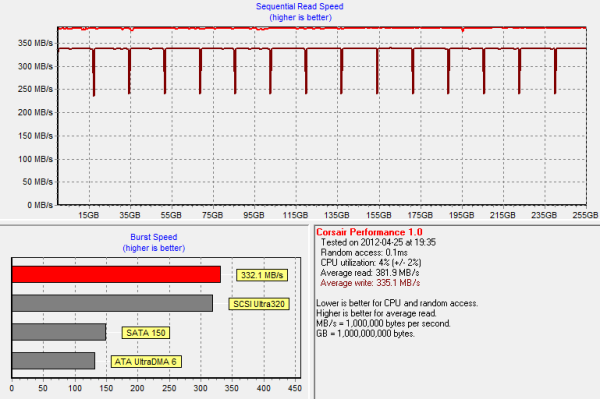
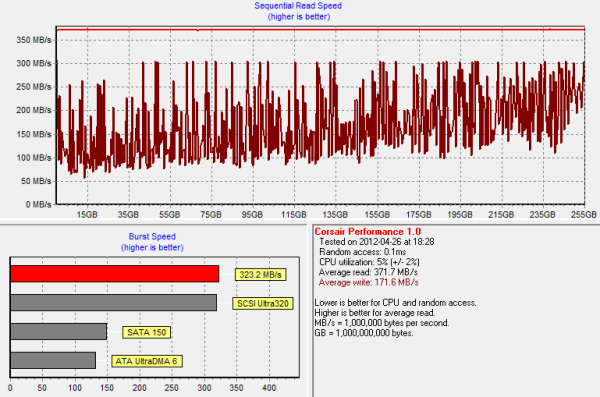
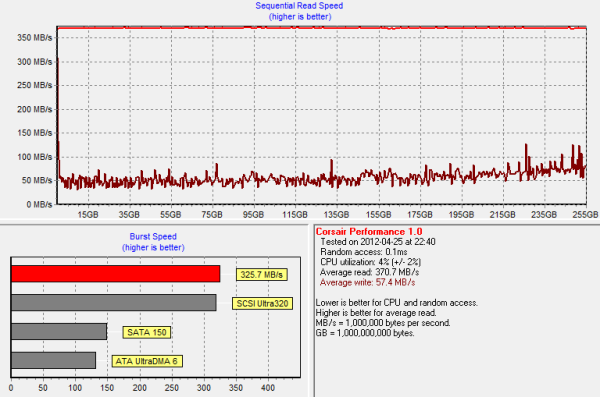
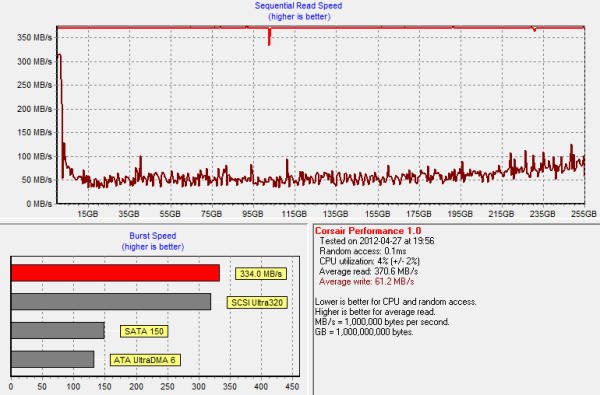
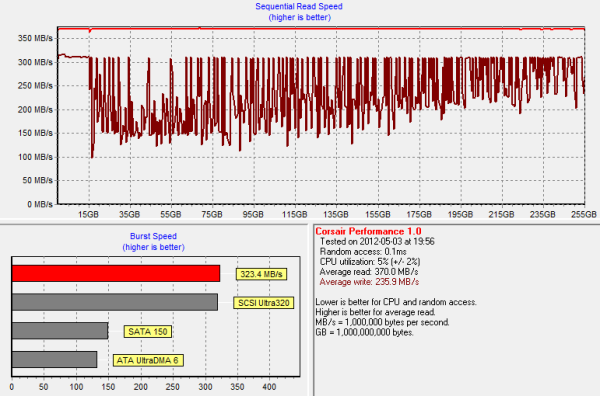
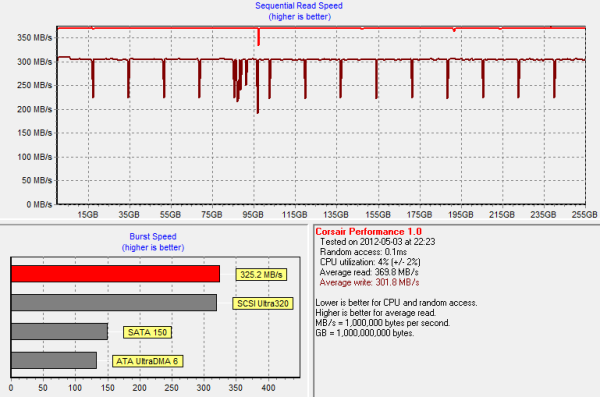
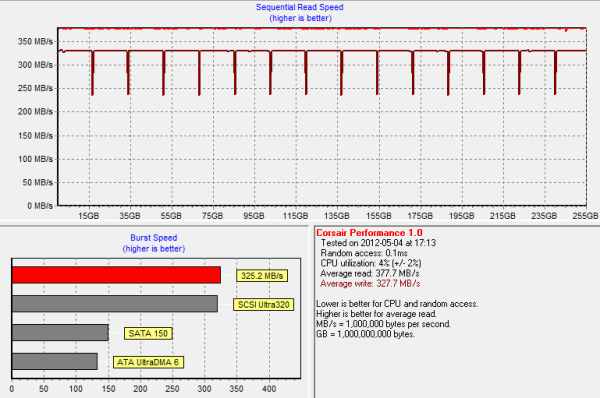








41 Comments
View All Comments
SlyNine - Monday, May 14, 2012 - link
Put a M4 in my GF's computer and she has had no problems at all. Friend also has one and again no problems.Just because you have had issues doesn't mean someone else will, if they were that easily repeatable they would be easy to fix.
ShieTar - Monday, May 14, 2012 - link
Why does this article contain two tables with the exactly same lable "NewEgg Price Comparison (5/5/2012)" but very different numbers?Kristian Vättö - Monday, May 14, 2012 - link
If you loaded the article right when it went live, it's possible that you saw two different tables. I updated the prices just before I posted this, but forgot to copy-paste the new table to the final page. Both tables should be up to date now, though.CyberAngel_777 - Thursday, May 17, 2012 - link
I wish you had two different dates and prices just show the price fluctuationsand then later with updated data also updated prices
every drive should have thickness data recorded
thank you!
Coroder - Monday, May 14, 2012 - link
Does the vertex 4 drive in this test use the new firmware that was made available? It increases the speed in most tests by quite a bit.XJDHDR - Monday, May 14, 2012 - link
I believe they are waiting for the firmware to come out of beta testing.jwilliams4200 - Monday, May 14, 2012 - link
Lite-On owns Plextor, so it is misleading to say that Plextor buys the SSDs from Lite-On. It would be more accurate to say that the Plextor / Lite-On relationship is like the Crucial / Micron relationship.koinkoin - Monday, May 14, 2012 - link
At my company we use McAfee Endpoint Encryption, how does this affect the performance of the drives and how much does this change over time?I went for a Plextor M3 256GB and seem to be working fine as for now, but only got it now for 2weeks.
rlhunts - Monday, May 14, 2012 - link
My company also uses the McAfee Endpoint Encryption. I upgraded the WD 250 GB 7200 RPM drive to a Samsung 830 258 GB SSD in my Dell laptop (I5 2540M processor) a couple months ago. It definitely helps, especially with boot time, but McAfee EE adds a lot of processor overhead, which a drive can't help with. It's still slow as a slug compared to the same machine and software configuration without McAfee with a traditional 7200 rpm hard disk.Movieman420 - Monday, May 14, 2012 - link
In all fairness the Vertex 4 needs to be re-tested with the latest 1.4RC fw...or wait til it's final then flash up.